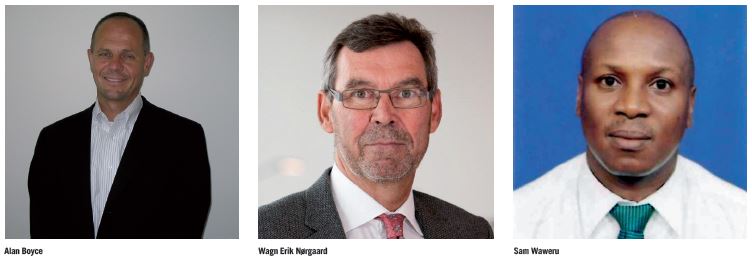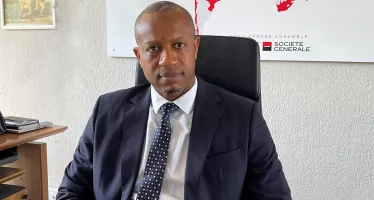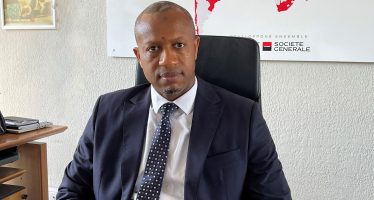Absalon Project: Sustainable Funding for African Housing
Sub-Sahara Africa has experienced strong economic growth and has developed a more stable political environment over the past twenty years. Fast population growth and a significant movement of people from the countryside to the larger cities has resulted in a shortage of urban infrastructure and housing. Local governments are under heavy pressure to ensure adequate infrastructure, housing and jobs.
By Alan Boyce, Sam Waweru and Wagn Erik Nørgaard
 Absalon Project, a joint venture between affiliates of VP SECURITIES and Soros Fund Management, is offering systems and know-how to introduce the Danish Mortgage Model on a global basis, and is currently undertaking implementation studies in several African countries.
Absalon Project, a joint venture between affiliates of VP SECURITIES and Soros Fund Management, is offering systems and know-how to introduce the Danish Mortgage Model on a global basis, and is currently undertaking implementation studies in several African countries.
A major issue in the housing sector is the lack of funding for potential homeowners. The financial industry currently offers very limited amounts of mortgages, usually to only to selected customers. Access to mortgages is restricted for the fast-growing middle class and the low-cost housing segment. If mortgages are offered, they are typically with an adjustable rate, of short duration and with relatively high costs for the borrowers. The funding of the mortgages is done on balance sheet, with deposits. This funding model creates significant risk to both the borrowers and the financial system, and limits the volumes.
“The Absalon SaaS solution makes it possible for the local mortgage companies to focus on both the customers and their needs, while the Absalon staff will take care of all IT and systems related issues. The customers get in one agreement an integrated solution with all the experience emanating from more than two centuries of mortgage operations integrated in the system.”
– Wagn Erik Norgaard, COO, Absalon Project
The Danish Mortgage Model, which has been around since the Great Fire of Copenhagen in 1795, eliminates many of these problems. It was the best performing system in Europe during the recent financial crisis, needing no sovereign bailouts or support from central banks.
First, it is a private system in which all mortgage originators can participate on equal terms, as long as they meet the rigorous regulatory requirements. There are no Government Sponsored Enterprises (GSEs) enjoying a quasi-monopolistic position.
Second, mortgage originators are required to retain credit risk and to perform the servicing functions. The originators are not allowed to take any interest rate risk. This perfectly aligns incentives, making the outcome of the borrower the same as it is for the mortgage bank.
Third, the mortgages are funded by the issuance of standardized bonds, creating a large and liquid market. The Danish mortgage bond market is the largest, always performing, non-taxpayer guaranteed mortgage bond market in the world.
Finally, the asymmetric nature of most mortgage systems (like in the US) is replaced by what the Danes call the Principle of Balance. Every mortgage is instantly funded by a bond of the same amount and tenor, and the two remains interchangeable at all times. Homeowners can retire mortgages not only by paying them off, but also by buying an equivalent face amount of bonds at market price.
“The Danish system enables homeowners to preserve the equity in their houses in periods with raising interest risk. There is a tendency that housing prices fall during such periods. At the same time they can buy back their bonds in the market – at a discount and at market price, and then refinance a lower amount at a higher interest rate. This protects homeowners against insolvency and makes the labor force mobile.”
– Alan Boyce, CEO, Absalon Project
Because the value of homes and the associated mortgage bonds tend to move in the same direction, homeowners should not end up with negative equity in their homes when interest rates rise. To state it more clearly, as home prices decline, the amount that a homeowner must spend to retire his mortgage decreases, because he can buy the bonds at lower prices.
The Danish mortgage market is EUR 375 billion in size, quite large for a population of only 5.3 million people. The traditional Danish mortgages are 30 year fixed rate mortgages, as well as a variety of 3, 5, 10 and 15 year fixed rate loans. Local insurance companies and pension funds are significant source of demand for the bonds, due to their longer term duration. Foreign investors are big buyers of Danish mortgage bonds as well.
Pension funds have been introduce in many countries in Africa, all looking to invest in high quality, long duration securities. Furthermore, large scale residential communities are being developed which need permanent funding options for the future homeowners.
Kenya is a good example of a country that has both the need for affordable housing finance and strong demand for high quality investments. It has a population of approximately 45 million people but less than 20.000 mortgages. Housing Finance, the leading mortgage bank in Kenya, has worked with Absalon Project for a couple of years before a decision was taken to enter into an implementation study.
“We have been investigating a number of different mortgage solutions and are seriously considering one along the Danish model, as it fits perfectly into what we try to achieve at Housing Finance.”
– Sam Waweru
Sam Waweru, Housing Finance Chief Finance Officer, explains: “We have been investigating a number of different mortgage solutions and are seriously considering one along the Danish model, as it fits perfectly into what we try to achieve at Housing Finance. We are looking for sustainable and low-risk funding to offer cheaper and better mortgage products to our customers. He continues: “The funding of mortgages at equal terms in the capital market takes out a lot of risk for us which we can use to lower the cost to our customers.”
Housing Finance sees also other benefits of the new model. As the model by definition funds mortgages by issuing standardized bonds in the market, they can save a lot of management time and reduce financial risks. They can then use their short term deposits to finance shorter term lending.
Absalon Project offers business and technical consultancy and Software as a Service (SaaS) solution, which means that all services will be delivered through the internet, and the local companies can focus on the business side and support of the participating banks, while Absalon Project will handle all IT related issues.
Factbox
VP SECURITIES A/S (VP) is the Central Securities Depository (CSD) in Denmark. It manages all registration of ownership, clearing and settlement of all securities in Denmark. VP is seen as the back office of all securities handling in Denmark. It was the first CSD to dematerialize securities in the world, with bonds in 1983 and shares and certificates in 1988.
About the Authors

Alan Boyce has enjoyed a long career in the capital markets. Currently, he is chief executive officer of Absalon, a joint venture between affiliates of Soros Fund Management and VP Securities, where he works to implement the beneficial aspects of the Danish mortgage system in the United States and other countries around the world.
Boyce was senior managing director at Countrywide Financial, responsible for management and leadership of the bank’s investment, hedging and funding strategies. He oversaw secondary markets, securities and loan purchase activities, commercial mortgage origination, MSR hedging, reinsurance, as well compliance with the Community Reinvestment Act. He was at Countrywide from March 2007 to June 2008.
Prior to joining Countrywide, Boyce served as Director of Special Situations at Soros Fund Management LLC. During his tenure with Soros, he managed a portfolio of assets of the Quantum Funds and had principal operational responsibilities for the bulk of Soros’ investments in Latin America. Boyce was a full time employee at Soros from August 1999 to March 2007.
Before joining Soros Fund Management, Boyce served as managing director at Bankers Trust. He was in charge of fixed income arbitrage, the bank’s mortgage portfolio and compliance with the Community Reinvestment Act. He was with
Bankers Trust for 14 years. Prior to that, he worked for the Federal Reserve Board in Washington, D.C.
Boyce holds an MBA degree from Stanford University and a Bachelor of Arts degree in Economics from Pomona College, where he graduated magna cum laude.
Wagn Erik Nørgaard is COO and a founding member of the Absalon Project. He has more than 35 years of experience in IT development and operations of large-scale financial systems.
Nørgaard joined VP Securities (for the second time) in June 2003 to represent Danish activities in Absalon. He was responsible for the successful development and implementation of Absalon’s first company – Hipotecario Total (Hito) in Mexico.
Prior to VP/Absalon Nørgaard was CEO of SMT Data a Danish software company that delivers solutions focused on performance and capacity management for IT infrastructure. Before that he was head of sales for the Nordic region at Hitachi Data Systems.
Nørgaard’s first stint at VP Securities saw him as Vice President and head of IT. At VP he was responsible for the development and implementation of large IT infrastructure projects including the dematerialization of Danish shares and the introduction of an electronic trading system at the Copenhagen Stock Exchange.
Nørgaard holds a BA in Computer Science as well as a BA in Organization and Economy from the Copenhagen Business School. He has also participated in management training at IMD and Henley business schools.
Sam Waweru is a business graduate from the University of Nairobi’s School of Business and a qualified certified public accountant, as well as a member of the Institute of Certified Public Accountants of Kenya (ICPAK).
Sam boasts a vast experience in the accounting and auditing fields and is currently the finance and administration director at Housing Finance. As such, he heads the entire Finance and Administration Division of the company and its subsidiaries.
Sam started his career at Ernst & Young, one of the big global accounting and auditing firms, and has served in accounting and auditing disciplines at various companies spread over ten different African countries and in the UK. These companies include Lonrho Africa Plc, Aga Khan University Hospital, and Uchumi Supermarkets Limited.
Sam is widely travelled within the African continent, Europe, North America and Asia. He is a keen golfer and is a member of Muthaiga Golf Club, Limuru Country Club and Parklands Sports Club.
You may have an interest in also reading…
CEO Thierno Ibrahima Diallo of Société Générale Guinée Shares the Secrets of his Career
CFI.co in conversation with Thierno Ibrahima Diallo, chief executive of Société Générale Guinée. Société Générale Guinée, a subsidiary of the
Société Générale Guinée – Guinean Gold: a Private Bank That Has Won Trust of Public
Société Générale Guinée has a century-and-a-half of history — and a go-ahead CEO who has overseen impressive growth. Société Générale
World Bank Initiative for a Low Carbon Future
The World Bank has announced a new Low-Carbon Liveable Cities (LC2) Initiative to support developing country cities around the world


















































































